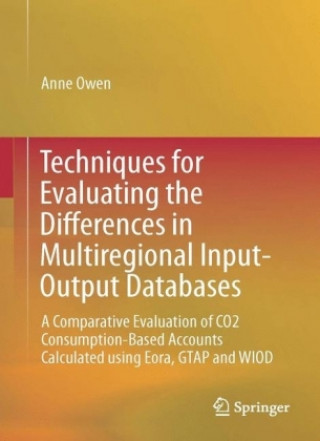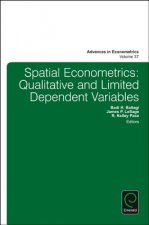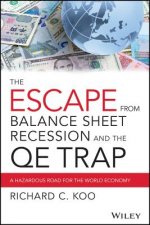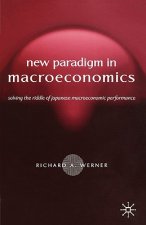
Code: 15496705
Techniques for Evaluating the Differences in Multiregional Input-Output Databases
by Anne Owen
This book introduces the Eora, Global Trade Analysis Project (GTAP) and World Input-Output (WIOD) databases and provides detailed metadata on the data sources, database structures and construction techniques used to build each sys ... more
- Language:
 English
English - Binding: Hardback
- Number of pages: 217
Publisher: Springer International Publishing AG, 2017
- More about this

130.20 €
RRP: 133.88 €
You save 3.68 €

In stock at our supplier
Shipping in 12 - 14 days
You might also like
-

R and Data Mining
97.92 € -

Data Mining with Rattle and R
90.96 € -12 % -

Spatial Econometrics
124.14 € -22 % -

Waste Input-Output Analysis
130.70 € -

Quantified Eco-Efficiency
273.01 € -

Handbook of Input-Output Economics in Industrial Ecology
414.01 € -

Victorian Geopolitical Aesthetic
51.12 €
Give this book as a present today
- Order book and choose Gift Order.
- We will send you book gift voucher at once. You can give it out to anyone.
- Book will be send to donee, nothing more to care about.
More about Techniques for Evaluating the Differences in Multiregional Input-Output Databases
You get 327 loyalty points
 Book synopsis
Book synopsis
This book introduces the Eora, Global Trade Analysis Project (GTAP) and World Input-Output (WIOD) databases and provides detailed metadata on the data sources, database structures and construction techniques used to build each system. It offers a detailed account of how multi-regional input-output (MRIO) databases are used to calculate consumption-based accounts - guiding the reader through each mathematical step and explaining the associated equations. It demonstrates that different MRIO databases calculate different national level consumption-based CO2 accounts. If these results are to be used as evidence in climate policy-making, analysts need to be confident about the accuracy of the databases and understand why the results differ. It carefully explains the mathematical equations behind each technique and provides a link to a repository where the reader can access specially prepared MATLAB functions associated with the techniques. To make meaningful comparisons between the three MRIO databases, each is mapped to a consistent classification system comprising 40 countries and 17 sectors. Further, readers can access the aggregated databases using the link provided. The effect of this aggregation is shown to be minimal, so readers can be confident that the aggregated versions of each database reflect the full-sized versions. The book concludes by making recommendations as to how future MRIO databases could be accurately and consistently constructed and how they should be used in policy-making in light of the findings.
 Book details
Book details
Book category Books in English Economics, finance, business & management Economics Macroeconomics
130.20 €
- Full title: Techniques for Evaluating the Differences in Multiregional Input-Output Databases
- Subtitle: A Comparative Evaluation of CO2 Consumption-Based Accounts Calculated Using Eora, GTAP and WIOD
- Author: Anne Owen
- Language:
 English
English - Binding: Hardback
- Number of pages: 217
- EAN: 9783319515557
- ISBN: 3319515551
- ID: 15496705
- Publisher: Springer International Publishing AG
- Weight: 556 g
- Dimensions: 244 × 160 × 18 mm
- Date of publishing: 17. February 2017
Trending among others
-

Theory of Money & Credit
15.02 € -4 % -

Macroeconomics, Global Edition
89.75 € -

Economics: A Very Short Introduction
9.27 € -28 % -

All About Forex Trading
17.74 € -22 % -

Theory of Money & Credit
25.30 € -

Blockchain Revolution
10.48 € -26 % -

Digital Gold
10.98 € -23 % -

Macroeconomics, Global Edition
83.90 € -3 % -

Macroeconomics For Dummies - UK
17.14 € -25 % -

Theory of Money and Credit
11.89 € -26 % -

Great Escape
17.44 € -12 % -

History of Money
12.70 € -21 % -

Business Cycles
13.30 € -15 % -

Philosophy of Money
24.20 € -14 % -

Cartoon Introduction to Economics Vol 2
16.43 € -22 % -

Manias, Panics, and Crashes
32.57 € -15 % -

Natural Resource and Environmental Economics
99.84 € -

End of Money
13.50 € -21 % -

Order Flow Analyses and Foreign Exchange Dealing
45.58 € -

Death of Money
11.29 € -28 % -

Macroeconomics
76.84 € -

When Money Destroys Nations
13.81 € -

Saving Capitalism
10.28 € -28 % -

Dollar Crisis, Causes, Consequence, Cures Revised and Updated edition
28.83 € -18 % -

Modern Money Theory
96.91 € -13 % -

End The Fed
15.62 € -25 % -

Cryptocurrency
12.19 € -22 % -

Advanced Macroeconomics
117.29 € -

History of Money
55.86 € -

Golden Fetters
75.43 € -

Why Most Things Fail
13.30 € -28 % -

Monetary Theory and the Trade Cycle
15.82 € -

Between Debt and the Devil
18.65 € -11 % -

Concise Guide to Macroeconomics, Second Edition
29.54 € -17 % -

Curse of Cash
21.17 € -

Little Book of Currency Trading
21.17 € -28 % -

International Macroeconomics
85.82 € -

How to Build a GPU Mining Rig to Mine Bitcoin, Monero, Ether, Zcash, and other Cryptocurrenices
15.32 € -14 % -

Contours of the World Economy 1-2030 AD
70.39 € -4 % -

Business Cycles
14.51 € -7 % -

Escape from Balance Sheet Recession and the QE Trap - A Hazardous Road for the World Economy
29.64 € -26 % -

Fluttering Veil
15.02 € -4 % -

Forex Trading Secrets: Trading Strategies for the Forex Market
39.42 € -15 % -

New Paradigm in Macroeconomics
169.33 € -12 % -

Before the Industrial Revolution
22.48 € -13 % -

Euro and the Battle of Ideas
28.73 € -

Great Escape
51.23 € -

Asian Godfathers
13.30 € -28 % -

Evolution or Revolution?
29.54 € -27 %
Collection points Bratislava a 2642 dalších
Copyright ©2008-24 najlacnejsie-knihy.sk All rights reservedPrivacyCookies


 15549 collection points
15549 collection points Delivery 2.99 €
Delivery 2.99 € 02/210 210 99 (8-15.30h)
02/210 210 99 (8-15.30h)